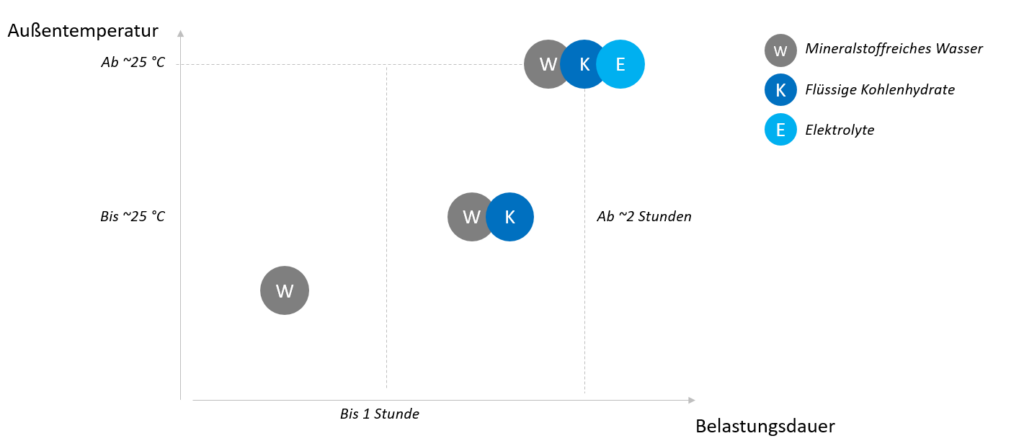Supply of water and liquid carbohydrates.
In general, a Beachvolleyball player, like any other athlete, should maintain a healthy and varied diet. A high proportion of complex carbohydrates (e.g., vegetables such as broccoli, green beans, potatoes, whole grain products) supplemented with the right amount of plant or animal proteins (cottage cheese, legumes, salmon, etc.) is suitable. For Beachvolleyball, there are slight deviations for selected foods that need to be considered.
Depending on the intensity of the Beachvolleyball activity, the sport can become very intense for the cardiovascular system. Playing at a higher level, the heart tends to work in a higher pulse range, sometimes throughout the entire sports unit. This is also due to the fact that almost all muscles in the body are used in Beachvolleyball. At the same time, the largest muscles in the body are also used (gluteal muscles, thighs, etc.), so the heart has to work faster to supply these large muscle groups with oxygen.
The higher pulse rate and lots of movement generally lead to sweating, which is usually amplified by high external temperatures during Beachvolleyball. Sweating has important functions, such as cooling the body and removing heat from the body. A trained athlete can easily lose 2 liters of water per hour in high external temperatures. Sweat consists mainly (99%) of water. The rest is salt and other various ingredients in small amounts such as uric acid, ammonia, lactic acid, etc.
This loss of water and minerals must be compensated for by drinking water during Beachvolleyball. If sufficient fluid is not consumed, it leads to a significant loss of performance and other physical symptoms such as cramps or headaches.
What amount of fluid do I need to balance?
As a rule of thumb for calculating additional fluid needs due to sweating during physical activity, it is recommended to consume one milliliter of fluid per burned kilocalorie. For example, a male Beachvolleyball player weighing 80 kg burns approximately 600 kilocalories during moderate play over 60 minutes. In addition to their normal daily fluid intake, they should consume an additional 600 milliliters (0.6 liters) of fluid. For women, the estimate is slightly lower, and we would use a -10% adjustment for the same estimation. Since most training sessions last about 2 hours, a minimum of 1.2 liters should be consumed. However, please note that gender, physical condition (and weight), and outside temperature have a significant impact on this value.
Caloric expenditure and fluid needs in Beachvolleyball.

Welche Flüssigkeit muss ich zu mir nehmen?
Je nachdem wie lange eine Beachvolleyball-Einheit ist und wie hoch die Außentemperatur ist müssen Kohlenhydrate und Elektrolyte (Natrium, Magnesium, Kalium usw.) zugeführt werden. Besonders stark verliert der Körper Natrium. Dies kann bei hohen Außentemperaturen ebenso zu Krämpfen führen. Grundsätzlich gilt, desto intensiver (Länge, Intensität) und desto höhere die Außentemperatur ist, desto umfangreicher müssen die Mineralstoffe umfangreicher zugeführt werden. Hierbei spielen natürlich das Alter, Fitnesszustand, Schweißneigung, Geschlecht usw. eine Rolle.
Grundsätzlich können wir daher folgende Vorgehensweise empfehlen:

Mineral-rich water as the basis for every sports session.
We have had very good experiences with mineral-rich water, particularly Gerolsteiner water. According to the label, Gerolsteiner water contains a total of 2,479 mg of minerals per liter, including 348 mg of calcium, 108 mg of magnesium, and 118 mg of sodium. This water is available in many supermarkets but is relatively expensive. We recommend the medium version, as the natural version has a lower mineral content. Another highly recommended water is Apollinaris.
Of course, there are many other types of mineral-rich water available. A simple search on the internet will yield good results. Here is an example:
https://www.plus-magazin.com/wp-contentnew/uploads/2013/07/Wasser-Liste.pdf
Liquid carbohydrates for higher intensities / temperatures.
There are various products (powders, gels, etc.) available on the internet. However, we recommend a simple apple spritzer. As the intensity of the training increases, you can start with water and then switch to apple spritzer. If you do not have any weight issues, you can directly start with apple spritzer from the beginning.
Isotonic drinks are also great and can be found in any supermarket, such as Iso Light at Aldi.
If an athlete is participating in a tournament, they should prefer isotonic drinks over water right from the start. Electrolytes should be added as the tournament progresses. When it comes to minerals, one should keep in mind that a so-called “frontloading” is usually necessary. The minerals need to be consumed before the competition and not during it, as it is usually too late.
Liquid carbohydrates also have the advantage of being a fast source of energy. They do not need to be broken down in the digestive tract. However, we recommend them only for more intense physical activities, as liquid carbohydrates can rapidly increase blood sugar levels, which can lead to various other disadvantages.
Electrolytes for intensive sports activities.
For intensive sports activities (see the chart above), we recommend taking additional electrolytes.
Electrolytes are minerals responsible for many important functions in the body. During beach volleyball, the body loses electrolytes, especially sodium, potassium, and magnesium, due to sweat and increased physical activity. If these electrolytes are not replaced, it can lead to dehydration and impaired physical performance.
Drinking electrolytes can help balance electrolytes in the body and improve hydration. Maintaining an adequate electrolyte balance in the body can help athletes train longer and recover faster. Additionally, electrolytes can help reduce muscle cramps and injuries and strengthen the immune system.
However, it is important to take the right amount of electrolytes, as an overdose can have negative effects. A balanced diet and drinking isotonics in appropriate amounts can help regulate electrolyte balance in the body and improve physical performance.
Our recommendations for electrolytes during beach volleyball on Amazon:


